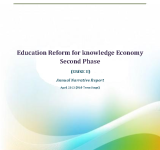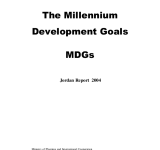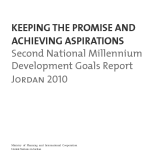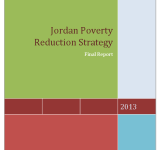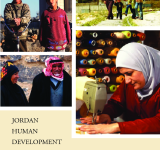The second phase of the Program Education Reform for the Knowledge Economy Program (ERfKE II) continues to build on the achievements of the first phase and follow the same implementation arrangements that have proven to be successful in (ERfKE I);; and in the same time;; focuses on schools as the locus of change as well as on the need to enhance capacity building at the central and field levels. The development objective of (ERfKE II) is to provide students enrolled in pre-tertiary education institutions in Jordan with increased levels of skills to participate in knowledge economy. Also the Mid-Term review highlighted the concrete progress achieved by (ERfKE II) in several key areas related to policy development;; quality of education interventions and school construction;; and identified the key issues as a summary of the overall progress that will be tackled and addressed during the remaining stage of implementation.
والتعليم
The Millenium Development Goals Report has been prepared through the active participation of the Jordanian Government and the UN Country Team. As scorekeeper of the MDGs;; UNDP supported the Ministry of Planning and International Cooperation in this joint endeavor. The objectives of this report are to create a baseline situation;; monitor progresses made to date;; and indicate what should be done in order to achieve the MDGs. The concluding section of fostering global cooperation gives an overview of national efforts to strengthen the basis and improve the environment for developing strong partnerships to achieve macroeconomic stability and other important national objectives.
Jordan’s second Millennium Development Goals Report 2010 shows the extent to which progress has been made towards achieving those targets and highlights the challenges that still confront the country to achieve these goals. The report seeks to identify the policies required for meeting the MDG targets by the year 2015;; at a time when the United Nations and the World’s governments are exerting a collective effort to review the progress achieved to date and identify the obstacles standing in the way of meeting the goals and targets by 2015.
The Government of Jordan adopted its first Poverty Alleviation Strategy in 2002 recognizing poverty as a key development problem requiring a comprehensive policy for improving the lives of the poor and socially excluded;; increasing their human capabilities;; providing them with economic opportunities and fully integrating them in the society. Considerable progress in poverty reduction has been achieved. The Government has put in place a series of social programs aimed at increasing employment opportunities;; curbing unemployment;; combating poverty and offering in-kind and cash assistance for the poor and marginalized groups within Jordanian society
Many reports talk about poverty and the poor;; but few actually provide the space for the poor themselves to take centre stage and to talk about their lives. Jordan’s second National Human Development Report redresses this imbalance. It places the poor at the centre of analysis and attempts to capture the diverse and dynamic characteristics of poverty through the eyes of the poor themselves. A major theme of the report is that the considerable human development gains that have been achieved at the macro-level in Jordan have yet to trickle down to many sub-groups among the poor. The report provides detailed recommendations to accelerate this process and to enhance positive outcomes for the poor.
